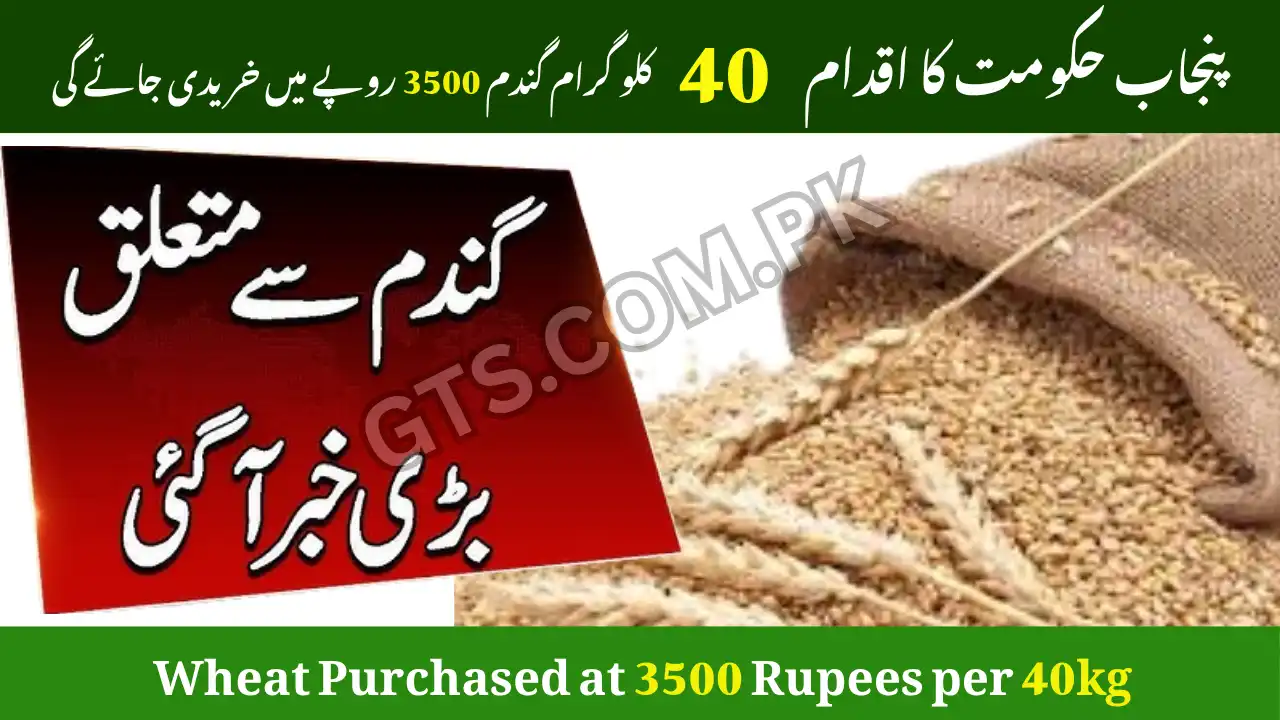Punjab Govt Initiative: Wheat Purchased at 3500 Rupees per 40kg
Introduction: A Landmark Initiative for Punjab’s Farmers
In a monumental move aimed at securing the welfare of Punjab’s farming community, the Punjab Government has introduced a game-changing initiative to procure wheat at 3500 rupees per 40kg.
This historic announcement is poised to transform the agricultural landscape of the province, where wheat is not only a vital crop but also the lifeblood of countless farming families.
With the support of the private sector, the Punjab government is setting a new benchmark for wheat procurement in the region, ensuring fair prices for farmers and offering a much-needed boost to the agricultural sector.
The Wheat Purchased at 3500 Rupees per 40kg initiative, launched in response to the ever-present challenges faced by wheat farmers, aims to stabilize the wheat market, prevent exploitation, and help farmers regain their financial footing.
This decision comes at a crucial time when inflation, market uncertainties, and middlemen interference have hindered the profitability of the farming community. With this new pricing structure, the Punjab government is leading the way towards a more equitable and prosperous future for farmers.
This article delves into the details of the Punjab government’s groundbreaking move, the benefits it promises to deliver, and the transformative potential it holds for the region’s economy. As we explore the key aspects of this initiative, we’ll also look at how it aligns with the government’s broader goals for agricultural development and rural prosperity.

The Importance of Wheat in Punjab’s Agricultural Economy
Wheat as the Backbone of Punjab’s Rural Economy
Punjab is known as the breadbasket of Pakistan, with wheat being one of the most important crops in the region. Not only does it contribute significantly to the province’s agricultural output, but it also sustains millions of livelihoods. For countless farming families in rural Punjab, wheat is more than just a crop—it’s their primary source of income, food, and security.
However, despite its importance, wheat farmers have faced significant challenges over the years. Unpredictable market prices, inadequate returns, and exploitation by middlemen have left many struggling to survive. In recent years, the absence of a fair pricing system has led to farmers being paid less than the cost of production, pushing many out of farming altogether. In response, the Wheat Purchased 3500 Rupees per 40kg initiative promises to ensure that farmers receive a fair and guaranteed price, thereby addressing these long-standing issues.
This initiative is not just about fixing prices—it is about restoring the dignity and prosperity of Punjab’s farming community. By securing a fair price for wheat, the government is not only helping farmers earn a sustainable income but also enabling them to reinvest in their land and farming practices.
Read More: CM Maryam Nawaz Launches Historic Flood Relief Program for Victims 2025
How the Punjab Government’s Wheat Procurement Plan Works
A Strategic Public-Private Partnership
The Wheat Purchased 3500 Rupees per 40kg initiative hinges on a strategic collaboration between the Punjab government and the private sector. In this new model, the private sector, including private millers and traders, will play a crucial role in wheat procurement. By working with private sector players, the government can ensure an efficient, competitive, and transparent procurement process.
Ensuring Fair and Transparent Pricing
The government’s role in this partnership is pivotal. By setting a fixed price of 3500 rupees per 40kg, the Punjab government is eliminating the uncertainty that often plagues the wheat market. This agreement also aims to reduce the power of middlemen who frequently exploit farmers. With the fixed price, farmers can now sell their wheat directly to buyers at a fair rate, ensuring that they are paid a reasonable amount for their produce.
The involvement of the private sector brings expertise in logistics, quality control, and market reach, ensuring that the wheat is procured and distributed efficiently. This public-private collaboration will streamline the procurement process, making it faster, more transparent, and more accessible for farmers.

Key Benefits of the 3500 Rupees per 40kg Wheat Price
What Farmers Gain from the New Price Structure
The introduction of 3500 rupees per 40kg as the procurement price offers a range of benefits for farmers, making it a landmark decision for the agricultural sector. Here’s a closer look at the advantages:
1. Fair and Stable Pricing for Farmers
The most significant benefit of this initiative is the guarantee of a fair price for wheat farmers. By fixing the price at 3500 rupees per 40kg, the government is offering a price that reflects the cost of production while providing farmers with a fair profit margin. This change not only protects farmers from the volatility of the market but also ensures that they do not bear the brunt of price fluctuations.
2. Boosted Income for Farmers
With this price structure, farmers are poised to see an increase in their income. This is especially important for those who have faced low returns in the past, where the price of wheat was often below the cost of production. With the new price in place, farmers will be able to cover their costs and earn a profit, which will enable them to sustain their farming operations and improve their living standards.
3. Promoting Agricultural Sustainability
A fair price for wheat will encourage farmers to continue growing the crop, which is vital for food security in the region. The initiative will also provide the necessary financial support for farmers to reinvest in their land, adopt new farming techniques, and improve their productivity. This, in turn, will ensure the sustainability of wheat farming in Punjab for years to come.
4. Reducing Middlemen Exploitation
One of the major issues with the traditional wheat procurement process was the dominance of middlemen, who often took a large share of the profits. With the government’s direct involvement in the procurement process, middlemen will be cut out of the supply chain, ensuring that farmers receive the full value for their wheat.
5. Strengthening Food Security
By stabilizing the wheat market, the Punjab government is helping secure a reliable supply of wheat for the domestic market. This will contribute to long-term food security for the province and reduce dependence on imported wheat, which can be costly and unreliable.
Read More: CM Kisan Card 2025 Key Benefits for Farmers
The Private Sector’s Role in Wheat Procurement
Strengthening the Supply Chain Through Collaboration
The involvement of the private sector in the Wheat Purchased 3500 Rupees per 40kg initiative is a key element of the government’s strategy. Private sector companies, including large milling companies and traders, will work alongside the government to procure wheat from farmers. These partnerships will help ensure that the wheat is procured efficiently and reaches the market in a timely manner.
Streamlining Procurement and Distribution
Private sector players bring valuable expertise in logistics, storage, and distribution, which will help streamline the entire wheat procurement process. This collaboration will ensure that wheat farmers have multiple channels to sell their produce, creating a competitive market and driving better prices.
Impact on Punjab’s Rural Economy
Revitalizing Rural Communities
The 3500 rupees per 40kg wheat price is not just a win for individual farmers; it’s a significant boost for the entire rural economy. As farmers earn more from their wheat crops, they will have more disposable income to spend on goods and services in their local communities. This will stimulate economic activity in rural areas, creating jobs and boosting local businesses.
H3: Empowering Local Economies
By providing farmers with a fair price for their crops, the government is empowering rural communities to become more self-sufficient and resilient. This, in turn, will contribute to the overall economic growth of the province, ensuring that rural areas are not left behind as the agricultural sector thrives.
Challenges and Considerations
Monitoring and Ensuring Transparency
While the 3500 rupees per 40kg initiative is a significant step forward, there are still challenges to overcome. One of the primary concerns is ensuring that the private sector adheres to the agreed-upon pricing and that farmers are not exploited. The government will need to put in place strict monitoring mechanisms to ensure that the procurement process remains transparent and fair.
Weather and Climate Risks
As with any agricultural initiative, weather conditions remain a major risk factor. Wheat farming is heavily dependent on climatic conditions, and extreme weather events such as droughts or heavy rains can severely impact crop yields. While this initiative guarantees a fair price, it cannot fully mitigate the effects of poor weather conditions.
Read More: CM Kisan Card 2025 Eligibility Criteria
Conclusion: A Step Towards Agricultural Prosperity
The Wheat Purchased at 3500 Rupees per 40kg initiative is a transformative step for Punjab’s agricultural sector. By ensuring a fair price for wheat, reducing exploitation, and fostering collaboration between the government and the private sector, this initiative is poised to create a more stable and prosperous future for farmers.
This decision not only strengthens the agricultural economy but also ensures that Punjab’s farming communities are empowered to face future challenges with greater confidence and resilience. With the new pricing structure in place, Punjab’s wheat farmers are on the path to a brighter, more secure future—one where fair pricing and sustainability lead the way.









